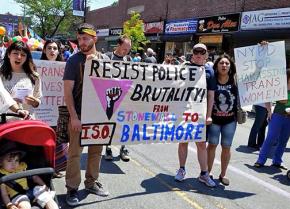Solidarity is how we win
makes a case for why the struggle for LGBT liberation is connected to the Black Lives Matter movement, in an article written for The Rainbow Times.
THE BALTIMORE Rebellion has reignited a national discussion about police violence and racism and what relationship the LGBTQ movement should take to the Black Lives Matter movement.
Far from being two separate issues, the fights to make Black Lives Matter and win social justice and equality for LGBTQ people are interconnected. Below is a list of five reasons why the LGBTQ movement needs to build solidarity with and fight alongside the Black Lives Matter movement.
1. Institutionalized racism is an LGBTQ issue. Some LGBTQ people are Black. This may seem obvious, but it's important to emphasize since it is unbelievable how commonly overlooked or ignored this simple point is. Understanding the interlocking oppressions that LGBTQ people experience means taking an intersectional approach to movement building that addresses the various oppressions that all LGBTQ people face--including racism. There can be no LGBTQ equality without racial justice.
2. Police violence is an LGBTQ issue. While they may not be household names like Michael Brown or Eric Garner, Black LGBTQ people are being directly targeted by police harassment, brutality, violence and murder. For example, several months before Freddie Grey was killed by police in Baltimore, law enforcement agents gunned down Mya Hall, a 27-year-old Black trans women. Violence against trans people, trans women of color in particular, is at epidemic levels. According to official reports, nearly a dozen trans women have been murdered in 2015 already, many of them in very brutal and gruesome ways. In each of these cases it has been common practice for the media to misgender and smear these women and for law enforcement to not take investigations seriously, just like they did with Trayvon Martin, Michael Brown, and countless other victims of police murder.

3. Mass incarceration is an LGBTQ issue. Pushed out of their homes and schools, homeless LGBTQ youth are often times pressured by their desperate circumstances to engage in criminalized economies to survive. Broken Windows policing, a strategy of law enforcement embraced nation-wide that emphasizes cracking down on minor offenses that disturb "public order," such as pan handling or sleeping or drinking in public spaces, as a way to prevent more serious crimes, results in police targeting and arresting homeless LGBTQ youth and LGBTQ youth of color at disproportionately higher rates.
Although LGBTQ people only make up 5 percent of the population, they encompass 40 percent of homeless youth in the country, and youth of color make up nearly half of that statistic. It's not a surprise then that homeless LGBTQ youth and LGBTQ youth of color are overrepresented inside the criminal justice system, or that 18 percent of Black trans women report having been incarcerated.
Rather than the criminal justice system protecting the most marginalized in society, it plays the role of policing and incarcerating them, while it lets some killer cops and bigoted murders walk free.
4. Stonewall was a riot against oppression, just like Ferguson and Baltimore, and it worked. Politicians and the media appear to be experts at historical amnesia and selective memory, so it's important to set the record straight (no pun intended) about a few things. LGBT Pride month occurs in June to commemorate the Stonewall Riots of 1969, a violent three-day-long rebellion in New York City against police brutality and oppression that gave birth to the modern LGBT movement. Taking this history into consideration, it's the height of hypocrisy for President Obama to acknowledge the importance of Stonewall on the one hand while condemning the protesters in Baltimore and Ferguson on the other. While the historical experience of LGBTQ people and African Americans and the historical context of Stonewall and the rebellions today obviously differ in significant ways, they share important similarities.
The corporate media was quick to demonize the Baltimore Rebellion as senseless acts of violence and property destruction, just like they did with Stonewall. But anyone who actually pays attention to the voices of participants in either event can see that the media's narrative is wrong. The targeting and killing of Freddie Grey and the pent-up frustration with pervasive and systemic police violence and racism is what detonated the rebellion. But the "riots" in Baltimore and Ferguson were just as much an uprising against three decades of neo-liberal economic policies, mass incarceration, and political neglect that have left working-class Black communities economically and socially devastated. Similarly, Stonewall was ignited by a routine police raid, but was an expression of rebellion against decades of police harassment and humiliation and pervasive homophobia, transphobia and discrimination.
Far from being counter productive, riots have helped to advance struggles for the oppressed throughout history. They've forced those in power to listen, they've awakened larger numbers of people in society to otherwise neglected struggles, and they've inspired wider layers of people across the country and even around the world to join the fight.
5. Solidarity wins. LGBTQ people, African Americans, workers, women, immigrants, the disabled--we are all up against a very powerful, highly organized, well-funded enemy. The more divided and fragmented our side becomes the easier it is for those at the top to maintain the status quo. That's why on our own we are powerless. But, when working people and oppressed groups come together and organize, build solidarity through championing each other's struggles, and fight collectively it gives us a shot at winning. Actually, it's the only way our side has ever won anything in the past.
First published at The Rainbow Times.


